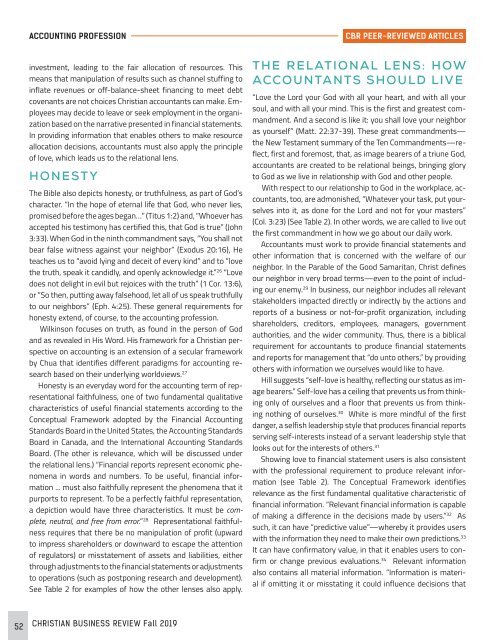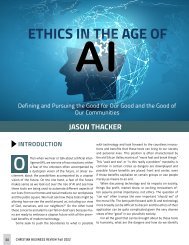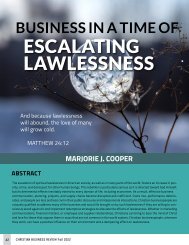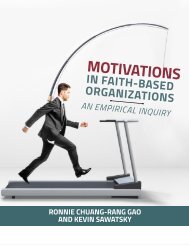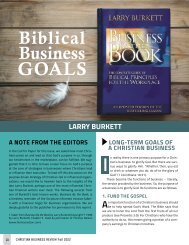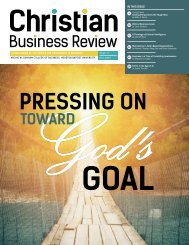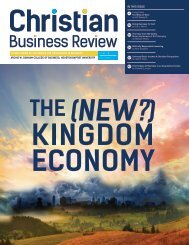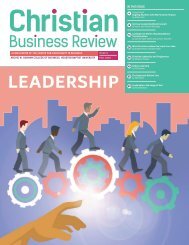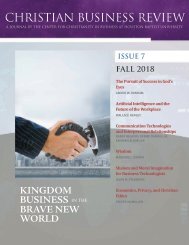Christian Business Review 2019: Workplace Practices That Glorify God (Issue 8)
Create successful ePaper yourself
Turn your PDF publications into a flip-book with our unique Google optimized e-Paper software.
ACCOUNTING PROFESSION<br />
CBR PEER-REVIEWED ARTICLES<br />
investment, leading to the fair allocation of resources. This<br />
means that manipulation of results such as channel stuffing to<br />
inflate revenues or off-balance-sheet financing to meet debt<br />
covenants are not choices <strong>Christian</strong> accountants can make. Employees<br />
may decide to leave or seek employment in the organization<br />
based on the narrative presented in financial statements.<br />
In providing information that enables others to make resource<br />
allocation decisions, accountants must also apply the principle<br />
of love, which leads us to the relational lens.<br />
HONESTY<br />
The Bible also depicts honesty, or truthfulness, as part of <strong>God</strong>’s<br />
character. “In the hope of eternal life that <strong>God</strong>, who never lies,<br />
promised before the ages began…” (Titus 1:2) and, “Whoever has<br />
accepted his testimony has certified this, that <strong>God</strong> is true” (John<br />
3:33). When <strong>God</strong> in the ninth commandment says, “You shall not<br />
bear false witness against your neighbor” (Exodus 20:16), He<br />
teaches us to “avoid lying and deceit of every kind” and to “love<br />
the truth, speak it candidly, and openly acknowledge it.” 26 “Love<br />
does not delight in evil but rejoices with the truth” (1 Cor. 13:6),<br />
or “So then, putting away falsehood, let all of us speak truthfully<br />
to our neighbors” (Eph. 4:25). These general requirements for<br />
honesty extend, of course, to the accounting profession.<br />
Wilkinson focuses on truth, as found in the person of <strong>God</strong><br />
and as revealed in His Word. His framework for a <strong>Christian</strong> perspective<br />
on accounting is an extension of a secular framework<br />
by Chua that identifies different paradigms for accounting research<br />
based on their underlying worldviews. 27<br />
Honesty is an everyday word for the accounting term of representational<br />
faithfulness, one of two fundamental qualitative<br />
characteristics of useful financial statements according to the<br />
Conceptual Framework adopted by the Financial Accounting<br />
Standards Board in the United States, the Accounting Standards<br />
Board in Canada, and the International Accounting Standards<br />
Board. (The other is relevance, which will be discussed under<br />
the relational lens.) “Financial reports represent economic phenomena<br />
in words and numbers. To be useful, financial information<br />
... must also faithfully represent the phenomena that it<br />
purports to represent. To be a perfectly faithful representation,<br />
a depiction would have three characteristics. It must be complete,<br />
neutral, and free from error.” 28 Representational faithfulness<br />
requires that there be no manipulation of profit (upward<br />
to impress shareholders or downward to escape the attention<br />
of regulators) or misstatement of assets and liabilities, either<br />
through adjustments to the financial statements or adjustments<br />
to operations (such as postponing research and development).<br />
See Table 2 for examples of how the other lenses also apply.<br />
THE RELATIONAL LENS: HOW<br />
ACCOUNTANTS SHOULD LIVE<br />
“Love the Lord your <strong>God</strong> with all your heart, and with all your<br />
soul, and with all your mind. This is the first and greatest commandment.<br />
And a second is like it: you shall love your neighbor<br />
as yourself” (Matt. 22:37-39). These great commandments—<br />
the New Testament summary of the Ten Commandments—reflect,<br />
first and foremost, that, as image bearers of a triune <strong>God</strong>,<br />
accountants are created to be relational beings, bringing glory<br />
to <strong>God</strong> as we live in relationship with <strong>God</strong> and other people.<br />
With respect to our relationship to <strong>God</strong> in the workplace, accountants,<br />
too, are admonished, “Whatever your task, put yourselves<br />
into it, as done for the Lord and not for your masters”<br />
(Col. 3:23) (See Table 2). In other words, we are called to live out<br />
the first commandment in how we go about our daily work.<br />
Accountants must work to provide financial statements and<br />
other information that is concerned with the welfare of our<br />
neighbor. In the Parable of the Good Samaritan, Christ defines<br />
our neighbor in very broad terms—even to the point of including<br />
our enemy. 29 In business, our neighbor includes all relevant<br />
stakeholders impacted directly or indirectly by the actions and<br />
reports of a business or not-for-profit organization, including<br />
shareholders, creditors, employees, managers, government<br />
authorities, and the wider community. Thus, there is a biblical<br />
requirement for accountants to produce financial statements<br />
and reports for management that “do unto others,” by providing<br />
others with information we ourselves would like to have.<br />
Hill suggests “self-love is healthy, reflecting our status as image<br />
bearers.” Self-love has a ceiling that prevents us from thinking<br />
only of ourselves and a floor that prevents us from thinking<br />
nothing of ourselves. 30 White is more mindful of the first<br />
danger, a selfish leadership style that produces financial reports<br />
serving self-interests instead of a servant leadership style that<br />
looks out for the interests of others. 31<br />
Showing love to financial statement users is also consistent<br />
with the professional requirement to produce relevant information<br />
(see Table 2). The Conceptual Framework identifies<br />
relevance as the first fundamental qualitative characteristic of<br />
financial information. “Relevant financial information is capable<br />
of making a difference in the decisions made by users.” 32 As<br />
such, it can have “predictive value”—whereby it provides users<br />
with the information they need to make their own predictions. 33<br />
It can have confirmatory value, in that it enables users to confirm<br />
or change previous evaluations. 34 Relevant information<br />
also contains all material information. “Information is material<br />
if omitting it or misstating it could influence decisions that<br />
52<br />
CHRISTIAN BUSINESS REVIEW Fall <strong>2019</strong>


